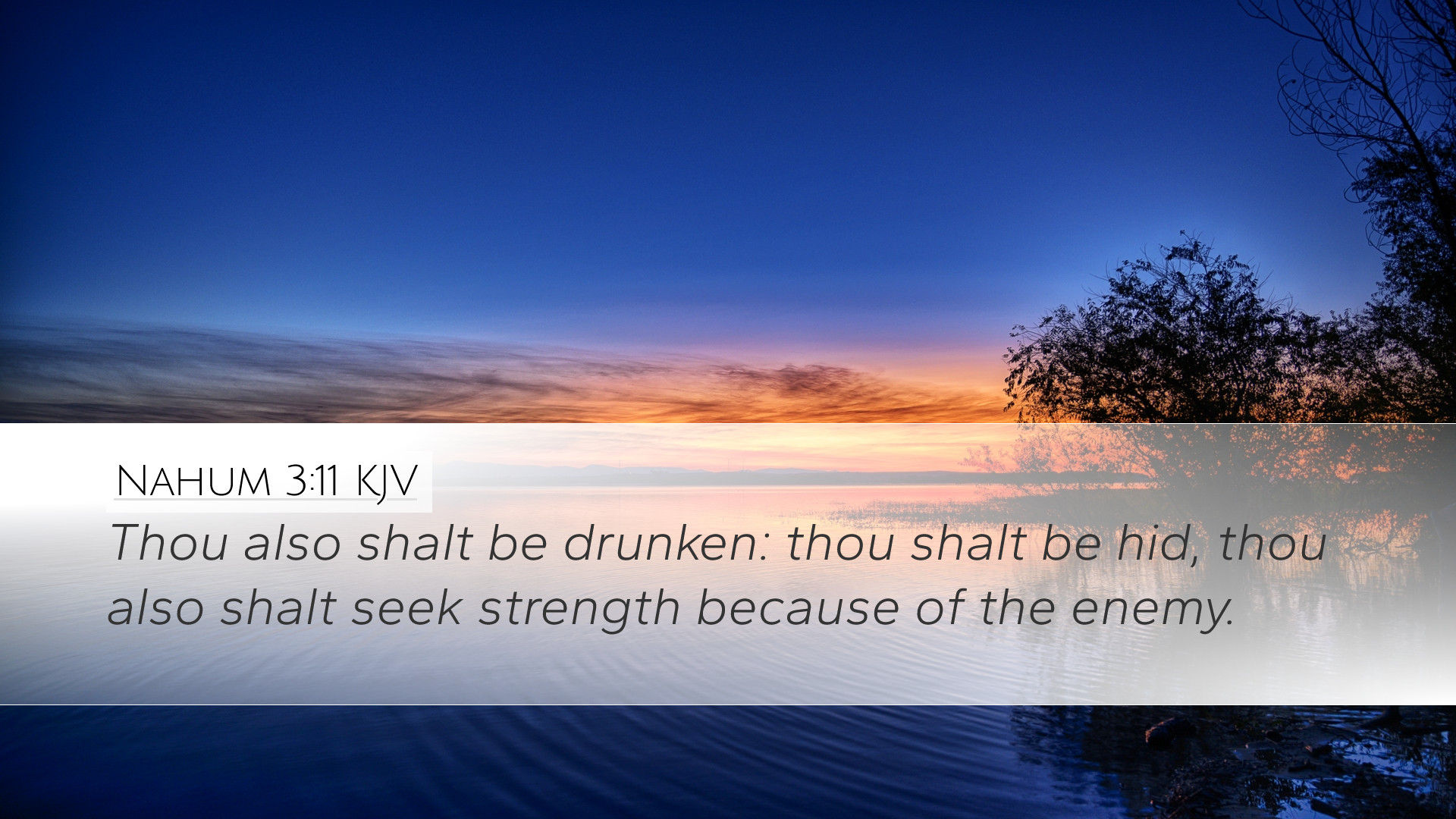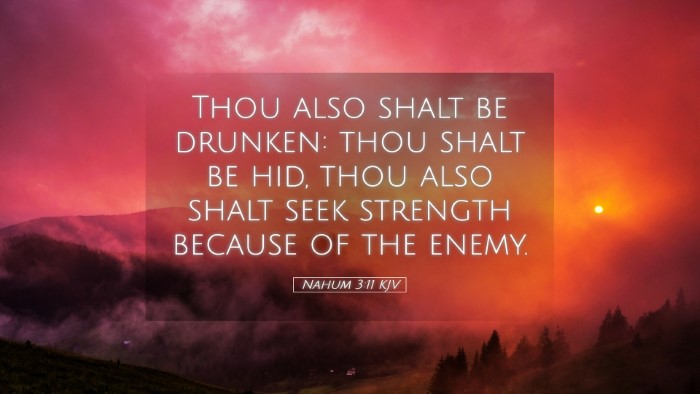Old Testament
Genesis Exodus Leviticus Numbers Deuteronomy Joshua Judges Ruth 1 Samuel 2 Samuel 1 Kings 2 Kings 1 Chronicles 2 Chronicles Ezra Nehemiah Esther Job Psalms Proverbs Ecclesiastes Song of Solomon Isaiah Jeremiah Lamentations Ezekiel Daniel Hosea Joel Amos Obadiah Jonah Micah Nahum Habakkuk Zephaniah Haggai Zechariah MalachiNahum 3:11
Nahum 3:11 KJV
Thou also shalt be drunken: thou shalt be hid, thou also shalt seek strength because of the enemy.
Nahum 3:11 Bible Commentary
Commentary on Nahum 3:11
Nahum 3:11 states, "Thou also shalt be drunken; thou shalt be hid, thou also shalt seek strength because of the enemy." This verse serves as a powerful conclusion to the prophecy against Nineveh, the capital of Assyria, known for its brutality and arrogance. The verse succinctly captures the theme of judgment prevalent throughout the book of Nahum.
1. Contextual Background
Nahum, a minor prophet, aptly portrays God's justice and the fate of those who oppose Him. Nahum's prophecies were directed towards Nineveh, which had previously repented at the preaching of Jonah but later returned to its wicked ways. As such, this verse signifies the impending doom awaiting the city.
2. Insights from Matthew Henry
Matthew Henry provides a deep theological insight into this verse, emphasizing the inevitability of divine judgment. He notes that the Assyrians would experience a drunkenness not just in a physical sense but also spiritually. In this state, they would be overcome by fear and despair at the approach of their enemies.
- Divine Retribution: Henry outlines how God will bring the nations upon Nineveh, leading them to seek refuge and strength against an enemy they cannot resist.
- Spiritual Blindness: The drunkenness metaphorically suggests a spiritual state devoid of clarity and understanding, ultimately leading to their downfall.
3. Albert Barnes’ Perspective
Albert Barnes furthers the discussion by elaborating on the imagery of drunkenness. He interprets it as a state of confusion that will engulf Nineveh as their enemies draw near.
- Symbol of Desperation: Barnes highlights that the drinking here represents desperation; seeking earthly means of protection in a time of impending judgment reveals the futility of man-made defenses.
- Hide and Seek: The idea of Nineveh seeking to hide signifies a profound acknowledgment of their guilt, suggesting that they knew the repercussions of their actions were upon them.
4. Adam Clarke's Analysis
Adam Clarke provides a historically enriched commentary on this passage, illuminating the implications of absolute judgment falling upon a once powerful city.
- The Last Moments: Clarke posits that this verse encapsulates the chaos and collapse that accompany divine punishment. The imagery points to a complete turnaround from strength to weakness.
- The Irony of Strength: He notes that seeking strength against the enemy is ironic, as it reflects the futility of attempting to rely on oneself rather than on God.
5. Theological Implications
When interpreting Nahum 3:11, pastors and scholars should consider the broader theological implications:
- Confirmed Sovereignty: The passage reinforces God's sovereignty over nations, illustrating that no power can withstand His decree.
- Call to Repentance: Though cited in prophetic judgment, this serves as a cautionary tale for modern readers, reminding them that turning away from God leads to inevitable consequences.
- Hope for Redemption: For believers, acknowledgment of sin naturally leads to the prayer for mercy, highlighting the importance of repentance in understanding God's grace.
6. Conclusion
Nahum 3:11 stands as a profound reminder of God's justice and the reality of divine judgment against sin. The thoughts of Henry, Barnes, and Clarke provide depth to our understanding of the text, allowing pastors and theologians to glean necessary applications for today. While it is a passage of stark warning, it also invites reflection on the nature of God's mercy and the importance of remaining steadfast in faith amidst trials.


